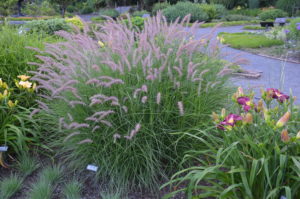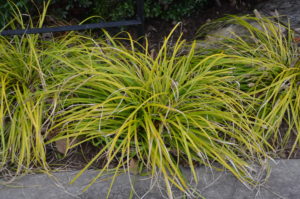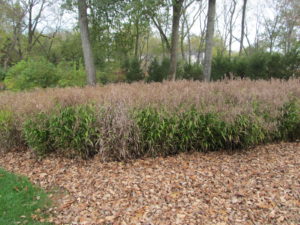Many gardeners have small sunny or partially shaded places where select ornamental grasses thrive, including using them as companion plants in containers. Enjoy their winter architecture. Perennial grasses should be cut back to 3- to 6 inches in late winter.
Here are an assortment of six of the very best along with several varieties that you should plant.
Fountain grasses (Pennisetum spp.) represent decorative ornamental annual grasses (zones 9-11). My favorites in the group are ‘Fireworks’, ‘Cherry Sparkler’, and ‘Rubrum’. ‘P. orientale ‘Karley Rose’ is a zone 6 hardy perennial form that has proven to be highly reliable over many years.
Hakone grasses (Hakonechloa macra) are short growing accent grasses from Japan. They thrive in shady garden areas as well as are included as accent plants in container designs. Three popular varieties are ‘Aureola’, ‘All Gold’ and the green species H. macra.
Feather reed grasses (Calamagrostis spp.) – grow 3-5 feet tall and 1 -2 feet wide. It has tight upright stance, and planted in multitudes to show off its erect architecture. The feathery plumes emerge in early summer and ripen to handsome wheat-colored seed heads in fall.
Japanese Sedges (Carex oshimensis) so many great ones to choose from-. Everest’ and ‘Everillo’ (chartreuse foliage) are two favorites in this group. Carex morrowii ‘Ice Ballet® and ‘Ice Dance’ are also favorites for moist well partially sunny areas.
*Little bluestem (Schizachyrium spp.) – ‘The Blues’ with stunning blue foliage, ‘Blaze’ for fall color, and ‘Standing Ovation’ (bluish-green, semi-erect habit) (zones 3-9).
*Sea oats (Chasmanthium latifolia) is a 2-5 feet tall clump-forming ornamental native grass. It is easily identified by their flat, drooping seed heads which hang in terminal clusters on arching stems. Seed heads flutter in the slightest of breezes. Seed heads emerge green but turn purplish bronze in late summer. Bright green leaves (5-9″ long) turn a coppery color after frost and eventually brown by winter. Excellent for dried flower arrangements.
*Warning: some grasses may seed in prolifically.




 Posted in
Posted in 
